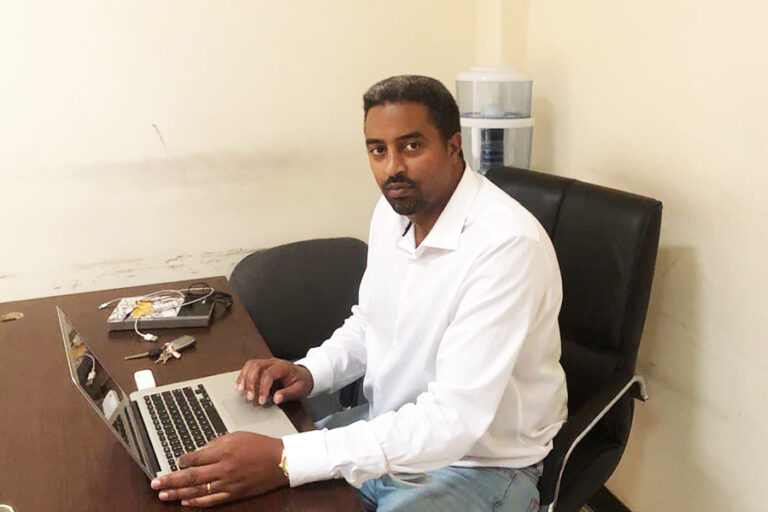Ethiopian athletes had been busy over the weekend setting new record and winning titles at European major cities. Dawit Seyoum and Berihu Aregawi won Women’s and Men’s 5KM race respectively in Lille-France while Zenebu Fikadu claimed San Sebastian World Athletics cross country Tour followed by compatriot Zerfe Wondemagne. Little known Chemdesa took everyone by surprise winning the 10KM race.
Ethiopia’s Dawit Seyaum took two seconds off the world record* for 5km in a mixed race, winning at the Urban Trail Lille event on Saturday (6) with 14:39. Dawit’s winning performance comes just two months after another Ethiopian Senbre Teferi , set a women-only world record of 14:29 for the distance at Herzogenaurach.
In the men’s race, Diamond League 5000m champion Berihu Aregawi of Ethiopia came within one second of Joshua Cheptegei’s world record, winning by more than half a minute in 12:52.
There was further Ethiopian success in the men’s 10km as the relatively unheralded Chimdesa Debele Gudeta won in 27:14 from Kenya’s Kenneth Kiprop (27:23). Steeplechase specialist Celliphine Chespol won the women’s 10km in 30:19 from fellow Kenyan Daisy Cherotich (30:31).
The 22-year-old was making her come back to competition in San Sebastian after almost two years, when she won the Venta de Banos cross country permit in December 2019. The other marquee athlete was her compatriot Zerfe, who finished eighth at the Tokyo Olympics in the 3000m steeplechase in a lifetime best of 9:16.41.
Though Spanish duo Carolina and Rodriguez took charge from the gun,it was an all Ethiopian show past the second round. At the bell, the 2019 winner, injected a brisker speed to leave the 19-year-old Zerfe clearly behind. to cross the line in 25:27. Zenebu crossed the finishing line in 25:27 with Zerfe a runner-up a second later.
Ethiopians dominate Europe Athletics weekend
Biniyam Abate
Name: Biniyam Abate
Education: Degree in Agriculture
Company name: Green View Garden Works
Title: Manager
Founded in: 2019
What it does: Works on different types of topography and greening
HQ: Addis Ababa
Number of employees: 5
Startup Capital: 100,000 birr
Current Capital: Confidential
Reasons for starting the business: Creating sustained income means
Biggest perk of ownership: Taking risks
Biggest strength: Knowledge in the field
Biggest challenging: Customer awareness
Plan: Building a strong company
First career: Teacher
Most interested in meeting: PM Abiy Ahmed Ali
Most admired person: My family and friends
Stress reducer: Working
Favorite past time: Reading
Favorite book: Oromay by Bealu Girma
Favorite destination: Iceland and Israel
Favorite automobile: Ford
Mobilizing Domestic Resources in Africa
As the current global economic trend clearly witnessed, Africa is on the rise while Europe and America are tied with the downward trend due to their current financial and economic woes. According to the recent United Nations economic report, five out of the ten countries the UN forecasted to register fast GDP growth in the year 2012 are African countries Ethiopia included.
The prevailing progress of Africa is not only on GDP growth, but also on the reduction of foreign aid. As the domestic private sector becomes the engine of growth across much of Africa, an increasing number of African countries are beginning to step away from aid dependency. Currently, at least a third of African countries receive aid that is equivalent to less than 10 percent of their tax revenue. They include Algeria, Angola, Equatorial Guinea, Gabon and Libya. This is a significant change from years of high dependency on aid.
Significant domestic resource mobilisation is essential to solidify ownership over development strategy and to strengthen the bonds of accountability between governments and their citizens. Adam Elhiraika, Director of the Macroeconomic Policy Division at the Economic Commission for Africa (ECA) stated that mobilising domestic resources, from both the public and private sectors, is central to Africa’s collective success in achieving the 2030 sustainable development goals (SDGs) and the continent’s 50-year development plan, Agenda 2063.
According to a comprehensive look at African resource mobilization by the recent African Economic Outlook report, on average, Africa has managed to raise an estimated 441 dollars in taxes per person per year while receiving 41 dollars per person per year in aid. In other words, what this means is that Africa as a whole receives aid that is less than 10 percent of collected taxes. Although aid exceeds 10 percent of tax revenue in 34 countries, these countries have shown a progressively higher expansion of their tax base. They include countries such as Mozambique that have almost doubled their tax revenue, as well as Liberia which in the last decade has increased tax revenue from six percent to about 20 percent. Ethiopia aspires to cover a round 70% of its annual budget by mobilizing domestic tax revenues. Botswana is another strong economy whose development is largely driven by domestically raised revenues. Although countries such as Rwanda raise more resources from donors, the nation also has a strong focus on foreign direct investment.
Roy Culpeper, President of The North-South Institute in Canada stated that in Kenya development is donor-driven, but aid has been useful in building sustainable infrastructure. As a result, Kenya has been able to build state of the art roads. For instance, the Thika Road super highway has made the real estate business in that region exponentially profitable. In similar fashion, Ethiopia’s infrastructure development is donor assisted. Many road and infrastructural development projects were financed by the country’s major development partners such as the World Bank, the European Union, the African Development Bank and the like. The construction of these roads greatly accelerated the country’s product movement and domestic trade. By the same token, this has attracted private investors and had a positive direct and indirect impact on taxes, as people establish and expand already existing businesses.
Uganda depends substantially on donor funding for development. But like Kenya, aid has gone into building strong infrastructure, which has created an enabling environment for private investment. On different occasions, the government of Uganda stated that in the last few years, Uganda’s economy has been driven by the growth in telecommunications, the construction industry, as well as the expansion of financial institutions – economic sectors dominated by private investors accounting for about 54 percent of the GDP, as compared to the agricultural sector that accounts for about 24 percent of the GDP.
According to Aniket Bhushan, a researcher at The North-South Institute in Canada, from Africa’s 54 countries, aid exceeds taxes in only 12 extremely poor countries such as Niger. But under that West African nation’s Accelerated Development and Poverty Reduction Strategy (ADPRS), which supports the growth of the private sector, additional revenue from this growth is projected to double the current real GDP growth rate to 11.5 percent.
Aniket Bhushan noted that politically stable and democratic countries in Africa such as Tanzania and Madagascar are now raising alternative resources primarily through increased taxation, trade and domestic borrowing. Aid has been the main source of income in countries such as Tanzania, which received 2.9 billion dollars in aid, making it the leading recipient of ODA in the region. However, economic analysts predict that the ongoing private-public partnerships in Tanzania will make the country more self-reliant.
These partnerships include the Southern Agricultural Growth Corridor of Tanzania (SAGCOT), a private-public agribusiness partnership meant to support small farmers. In Kenya, leading private companies such as Safaricom, East African Breweries Limited and private banks have widened the country’s tax base by expanding their branches and scope of distribution, consequently increasing the number of people who are employed and, thus, taxed. Safaricom is a leading mobile network operator in Kenya.
The private sector has proved useful in boosting GDP. Years of depending on agriculture has been Africa’s undoing. Consequently, more African countries are now diversifying their economies by creating an enabling environment for the private sector to thrive. Already, telecommunications is one of the main sectors driving Uganda’s economy. The involvement of the private sector in establishing profit-driven educational institutions has become another source of revenue. According to the United Nations Educational, Scientific and Cultural Organization (UNESCO), South Africa, Senegal and Nigeria have the highest number of such institutions.
While much more remains to be done by government to stimulate domestically-funded development in Africa, the African private sector is increasingly giving greater focus to corporate social investment and core business alignment, to help African governments to implement their national development agenda initiatives. The end result of both domestic resource mobilization and private-public partnership acceleration has been greater African autonomy in regard to the continental development agenda and this has been universally regarded as a very positive trend.
TACKLING CLIMATE CHANGE
By definition, climate change refers to long-term shifts in temperatures and weather patterns. These shifts may be natural, such as through variations in the solar cycle. But since the 1800s, human activities have been the main driver of climate change, primarily due to burning fossil fuels like coal, oil and gas. Burning fossil fuels generates greenhouse gas emissions that act like a blanket wrapped around the Earth, trapping the sun’s heat and raising temperatures.
Examples of greenhouse gas emissions that are causing climate change include carbon dioxide and methane. In order to combat the effect s of climate change various actions and action plans have been taken to curb the issue across the globe.
Founded in October, 2005, to tackle climate change, the C40 Cities Climate Leadership Group was formed as a group of 97 cities around the world that represents one twelfth of the world’s population and one quarter of the global economy. Created and led by cities, C40 is focused on fighting climate change and driving urban action that reduces greenhouse gas emissions and climate risks, while increasing the health, wellbeing and economic opportunities of urban citizens.
Here in Ethiopia, the C40 group has been working in partnership with Addis Ababa Environmental Protection and Green Development Commission (EPGDC) by developing a Climate Action Plan to address the challenges and achieve a climate-resilient, green economy. Tibebu Assefa, who is a climate change resilience and mitigation expert, has been working with C40 as an Addis Ababa City Adviser and quite recently as a Technical Advisor – Air Quality, East Africa for the global group. Capital caught up with Tibebu for a candid insight on how the capital city is tackling climate change. Excerpts;
Capital: What is the purpose of the Climate Action Plan?
Tibebu Assefa: It is imperative to look into both developmental and environmental issues that impact the lives of urban residents and take bold actions in building a clean, safe, inclusive, and resilient city. Addis Ababa is a fast-developing, cultural, and innovative Ethiopian and African hub. Like many other cities around the world, climate change faces a great threat to its growing population and economy. Flooding, extreme precipitation, increased temperatures, and droughts will soon become frequent events. The city has created a Climate Action Plan to address the challenges and achieve a climate-resilient, green economy.
Capital: What kinds of efforts are required to protect the city from the effects of climate change?
Tibebu Assefa: The Climate Action Plan is necessary to take steps in addressing the climate change challenges of the city. It will also support the national and global aim to create a carbon-neutral and resilient world. The CAP is prepared by Addis Ababa EPGDC in collaboration with the C40 cities climate leadership group. In addition, the plan preparation includes stakeholders from city and national level government and non-government institutions. The CAP has 34 key climate actions (14 mitigation and 20 adaptations) that have been designed with the primary goal of adapting to and mitigating the worst effects of climate change on the city. The goal is to reduce GHG emissions and to create a resilient city in the changing climate. Some of the major actions included in the plan are: Increasing green spaces, addressing water scarcity and flooding, reducing emissions, and implementing renewable energy solutions. The plan aims to reduce emissions and vulnerability by 41% and 30% by 2030 respectively from the baseline.
Transport sector greenhouse gas emissions are the main polluters in the city. For this, promoting non-motorized transport is one of the mitigation actions. Addis Ababa transport bureau is making efforts to reduce GHG emissions from the transport activities in the city. The Bureau is promoting walking and cycling, and the use of mass transport systems through bus dedicated lanes to promote mass transit. Another big contributor to the city’s greenhouse gas emissions is the waste sector. Traditional waste management allows for harmful methane to be released into the atmosphere. The implementation of the CAP will greatly benefit the waste sector. It will improve the waste management system and will also reduce greenhouse gas emissions. The AAEPGDC within its energy team is promoting improved cook stoves and renewable energy such as solar panels. Some of the activities include developing cook stove standards, capacity building for cook stove manufacture, etc.
Moreover, the city is expanding its green area coverage by planting 9 million trees seedlings through earmarking 1 billion Ethiopian Birr which is being allocated for tree planting initiatives. This will help increase green spaces in the city from 0.9 meters squared per capita to 5 meters squared in a 10-year perspective plan. These initiatives also help reduce greenhouse gas emissions. Trees absorb carbon dioxide which increases the quality of air as well as offering a place for social and community gatherings.
The climate action plan ensures work will be done to increase the city’s adaptive capacity of people to climate hazards such as flooding, water scarcity, landslides, and fires. Addis Ababa’s fast urbanization spatially, demographically, and economically means that the impact of climate change will be higher, especially on vulnerable communities such as informal settlements.
Capital: What should be done to protect the city from climate change? What are the recommendations of the action plan?
Tibebu Assefa: Upon the implementation of the CAP, it will increase the city’s adaptive capacity in managing climate hazards like flooding, water scarcity, landslide, fire, and other effects of climate change. It is important for individuals, communities, and organizations to all play their part, along with the city and private sector. An individual can contribute by examining their decisions when it comes to daily aspects such as energy usage and proper disposal of waste.
Institutions and companies should make greater efforts to reduce their carbon footprint and invest in a green economy. These efforts will help transform Addis Ababa into the new flower that its name refers to; a greener, livable city for its inhabitants support the Addis Ababa City Administration and C40 Cities in identifying climate risk and prioritizing adaptation actions for current and future climate protection.
Capital: What were the processes that led to the development of the plan? Who were the participants involved in the CAP?
Tibebu Assefa: The Addis Ababa CAP has been developed as part of the Climate Action Planning Africa programme, which was initiated in 2017 by C40 Cities Climate Leadership Group. As part of that programme, Addis Ababa signed up to C40’s ‘Deadline 2020’, pledging to reduce GHG emissions to net zero by 2050. This CAP responds to the specific requirements of the C40 Climate Action Planning Africa programme.
The CCRA was conducted via desk-based review of relevant documents pertaining to climate change, climate resilience and overarching development goals of Addis Ababa and Ethiopia. Climate risks were studied, identified and discussed, and key adaptation actions were identified, prioritized and defined in their regard. A series of two workshops was held with a range of key stakeholders from the City and C40. Stakeholders were identified with the help of the C40 City Advisor and engaged from project inception to ensure that the risk assessment conducted, and adaptation actions identified are salient, credible and legitimate.
The action presented existing plans and strategies which is called the Strategic CAP Appraisal; development of an emissions inventory and review of climate hazards; analysis of future emission trends and climate risks; and a series of discussions and workshops with key stakeholders. These were used to identify and priorities suitable responses to the challenges of reducing emissions and managing climate risks.
Capital: What are the environmental challenges of the city?
Tibebu Assefa: Addis Ababa is located within the Awash River basin, fed by three rivers and their tributaries (Akaki Major, Akaki Minor and Kebena). Around 20% of Addis Ababa is located within former floodplains making it vulnerable to flooding. Air quality is already a challenge due to industrial and construction activity, car ownership and uncontrolled waste burning. Water quality and availability is also a challenge due to high consumption rates, depleted groundwater supplies and pollution due to low levels of waste management
Capital: How big will the problem be in the future?
Tibebu Assefa: As climate change continues over the 21st century, it is projected that there is a high probability most climate hazards and their primary climate impacts will worsen and have high (severe) consequences on key sectors.
Capital: How big is the problem now?
Tibebu Assefa: Current major climate hazards and primary climate impacts of climate change are already an issue and will continue to present significant risks and challenges for Addis Ababa and its future development. Ongoing climate change and associated weather events mean that Addis Ababa is experiencing a range of climate hazards and resultant primary climate impacts, including: Extreme precipitation, rainstorms and variability of the rainy season; Extreme temperature, including heat waves and extreme hot days and night; Water scarcity, including drought and subsidence; Flooding, including flash (surface) flooding and river flooding, and landslides.
Capital: What is the purpose of Addis Ababa Climate Action Plan?
Tibebu Assefa: The CAP is intended to provide an overarching narrative that not only explains what actions are proposed for Addis Ababa, but also states, in a transparent way, what the process was for developing each action, and what the arrangements will be for ensuring that they are implemented effectively.
To make the city carbon neutral and resilient to climate change, and set out a ‘green path’ that safeguards resources for future generations. The CAP identifies key emission sources by sector within the city under the “basic level” of reporting of the Global Protocol for Community-scale Greenhouse Gas Emission Inventories Standard, in order to a set of recommendations and pathways towards an equitable, inclusive, climate resilient and carbon neutral Addis by 2050.
The document identifies city-specific actions in relation to both climate change adaptation and mitigation, that aim to transform the ways in which people in Addis Ababa travel, work and go about their lives; Sets targets on how to achieve transformational change in the city by the years 2030, 2040 and 2050; Documents the potential emissions reductions that could be achieved by implementing these actions; Provides strategic guidance to the Addis Ababa City Administration (AACA), as well as other relevant institutions and departments, on priority interventions; and explains the wider co-benefits for human society and the natural environment that are associated with climate change.






